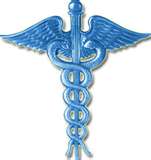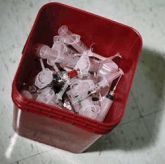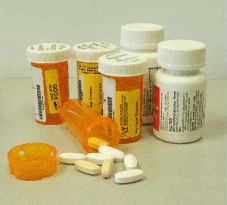
Healthcare facilities may include a school or plant nurse's office, physician's office, dental
office, medical clinic, assisted-care and long-term care facilities, hospital, veterinary clinic, animal
hospital, laboratories, research facilities and universities.
Infectious Waste

Generators
of regulated infectious waste at these facilities should separate it from other
wastes. Infectious waste should be placed in distinctive containers (such as red
bags) which do not leak and are puncture and tear resistant. The containers
should also be labeled with the universal biohazard symbol and the word
biohazard. You should also include the words infectious waste or medical waste.
Following are North Dakota publications to assist you in the proper management of regulated infectious
waste:
North
Dakota Solid Waste Management Rules - Regulated Infectious
Waste
A Guide to
Understanding North Dakota's Infectious Waste Regulations
Infectious Waste Treatment/Disposal Facilities
Following are links to federal sites regarding infectious waste
management:
Environmental Protection Agency
- Medical Waste
Centers for Disease Control And
Prevention - Infection Control
Occupational Safety
Health Administration -
Bloodborne Pathogens and Needlestick Prevention
Occupational Safety
& Health Administration -
Hospital E-Tool
Occupational
Safety & Health Administration - Occupational Hazards in Long Term Care Nursing
Home E-Tool Pharmaceuticals

Healthcare facilities are also required to manage
their pharmaceuticals
properly. Many facilities use a Reverse Distributor to manage their unused and outdated pharmaceuticals.
Those pharmaceuticals that cannot be managed through a reverse distributor
program, such as
outdated (but not returnable for credit), used in compounding or IV preparation,
spilled, no longer useable for its intended purpose and any
items used in spill cleanup (vermiculite, paper towels and the like) must be
characterized as either hazardous or non-hazardous waste and managed properly. The
North Dakota Pharmaceutical Waste Guidance can assist you in determining
if your waste pharmaceuticals are hazardous waste or not.
Following are links to various sites regarding disposal of pharmaceuticals
from healthcare facilities:
Minnesota
Pollution Control Agency - Health Care Industry
Healthcare Environmental Resource Center
PharmEcology -
Establishing Compliant And Cost-Effective Procedures To Manage Pharmaceutical
Waste
If you have further questions contact Diana Trussell by
e-mail or telephone 701.328.5164.